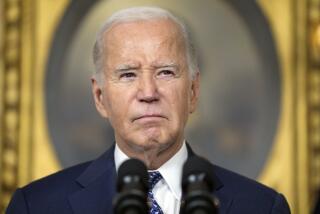CIA Official Admits Illegal Arms Shipment Role
WASHINGTON â CIA counterterrorism chief Duane (Dewey) Clarridge has acknowledged that he made logistical plans for arms shipments to Iran in late 1985, even after being told by superiors that his actions were illegal without the explicit approval of President Reagan, according to testimony released Wednesday by Congressâ Iran- contra committees.
Clarridgeâs testimony, taken by the committees in closed session Aug. 4, was released with a stack of previously classified CIA documents which suggest that the agency played a wider role in the Iran-contra affair than officials have admitted so far.
Nevertheless, Clarridge denied that he was aware of most activities described in the documents and he consistently contradicted the testimony of Lt. Col. Oliver L. North and other government officials who linked him to any potentially illegal aspects of the affair.
Clarridge, a protege of the late CIA Director William J. Casey, is known to be the subject of an internal CIA inquiry into the agencyâs role in the scandal. He frequently answered questions by saying: âI do not recall.â Because of such answers, Sen. William S. Cohen (R-Me.) questioned how Clarridge had ever achieved a top CIA post.
âOn practically every single major event that we have been considering, you have virtually no memory at all,â Cohen said to Clarridge. â . . . I was just wondering how you reconcile that frankly with your positions you have held over the years and theyâve really been truly outstanding.â
Clarridge headed the CIAâs Latin American division between 1981 and 1984, during the period when the Reagan Administration was just beginning to provide support to the Nicaraguan resistance through the CIA. He then became chief of the European Division--the job he held at the outset of the Iran arms sale.
Although Clarridge conceded that he helped to arrange logistical support for the first U.S.-sponsored Israeli arms shipment to Iran on Nov. 25, 1985, he insisted that he believed he was helping only to ship sophisticated oil-drilling equipment, not weapons. He said he cannot remember being told until the following January that the shipment was Hawk missiles.
Clarridge denied that he was told the true contents of the shipment by North, the White House aide who initially contacted him Nov. 22 in seeking his assistance. But he said it was possible that he learned of the contents from Charles Allen, a fellow CIA official, shortly after the shipment occurred, as Allen has previously testified.
Under the law, the CIA is prohibited from taking part in any covert operations without the expressed approval of the President. At the time of the November shipment, Reagan had not signed any document approving it. In addition, U.S. law prohibits the sale of oil-drilling parts, as well as weapons, to Iran.
After the November shipment, Clarridge said, he was admonished by then-CIA Deputy Director John N. McMahon for his role in the affair. As he recalled it: âJohn McMahon called me and said that âI donât care whether there are arms or oil equipment on the aircraft, they are both embargoed items. And I believe we may need a finding.â â
Nevertheless, Clarridge acknowledged that he continued to assist in making logistical arrangements for four additional Israeli arms shipments to Iran without ever asking whether they had presidential approval. None of those shipments were ever completed, however.
Clarridge explained his actions by noting that his superiors were aware of it and never told him to stop. âSupposedly,â he said, âthe people superior to me getting the cable traffic (who) are not telling me to cease, must have a reason to tell me to continue on.â
On Dec. 5, according to former National Security Adviser John M. Poindexter, the President signed a document retroactively approving the November shipment. Ironically, Clarridge recalls his activity ended on that day.
When confronted with a note written by North to Poindexter on Dec. 4 that described Clarridge as âthe only (other) person fully wittingâ of the arms-for-hostage scheme at that time, the CIA official said he never received such a briefing from North. But he added that North âhad a tendency to use my nameâ with his superiors âbecause if I said it was a good idea, then they tended to think it was a good idea.â
Likewise, Clarridge denied having a number of other conversations with North that were recorded in Northâs personal diaries.
The committees made public also a series of secret cables suggesting that the CIA had solicited funding from another, unidentified country for the Nicaraguan resistance during 1984, when it appeared certain that Congress would suspend direct U.S. military assistance.
In March, 1984, for example, Casey wrote a memorandum to then-National Security Adviser Robert C. McFarlane saying that he and his aides were âexploringâ means by which the forces could receive âequipment and materiel from some other source.â
The following month, Clarridge traveled to the unidentified country, ostensibly to brief officials there on developments in Central America. But Clarridge insisted that he neither solicited nor received any offers of direct aid for the contras from that country.
More to Read
Get the L.A. Times Politics newsletter
Deeply reported insights into legislation, politics and policy from Sacramento, Washington and beyond. In your inbox three times per week.
You may occasionally receive promotional content from the Los Angeles Times.










